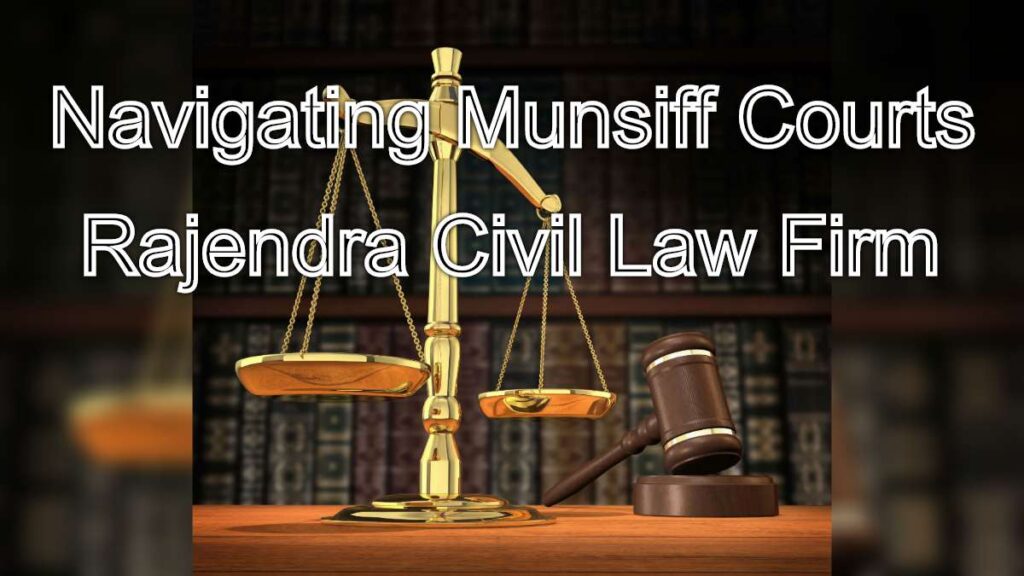Navigating Munsiff Courts: The Indian legal system can appear complex, especially when dealing with civil disputes. Munsiff courts, the courts of first instance for many civil matters, play a crucial role in resolving these disputes. However, navigating the intricacies of Munsiff court procedures can be daunting. Here at Rajendra Civil Law Firm, we understand the challenges individuals face when presenting their cases before these courts. We are dedicated to providing you with the essential legal guidance you need to navigate the process with confidence.
Navigating Munsiff Courts: Essential Legal Guidance for Your Case: Rajendra Civil Law Firm
Understanding Munsiff Courts
Navigating Munsiff Courts: Munsiff courts are the lowest level of civil courts in India. They handle a wide range of civil matters, including:
- Money Suits: These suits involve claims for recovery of money owed, such as debts or unpaid contracts.
- Property Disputes: Disputes related to ownership, possession, or inheritance of property often find their way to Munsiff courts.
- Eviction Suits: Landlords seeking to evict tenants may file these suits in Munsiff courts.
- Partition Suits: When co-owners of property seek to divide the property, they can file a partition suit in a Munsiff court.
Jurisdiction of Munsiff Courts
The jurisdiction of a Munsiff court is typically limited by geographical boundaries and the value of the dispute. It’s important to determine whether the specific Munsiff court has jurisdiction to hear your case before filing your suit. A qualified lawyer can assist you in verifying this.
The Importance of Legal Representation
While it’s technically possible to represent yourself in a Munsiff court, having an experienced lawyer by your side is highly beneficial. Here’s why:
- Understanding Court Procedures: The legal process involves specific procedures and formalities. A lawyer can guide you through these steps, ensuring your case is presented correctly and efficiently.
- Gathering Evidence: Building a strong case requires gathering relevant evidence to support your claims. Your lawyer will have the expertise to identify and secure the necessary evidence.
- Arguments and Advocacy: Presenting compelling arguments in court is crucial for a successful outcome. Your lawyer will possess the legal knowledge and skills to effectively advocate for your rights and interests.
- Negotiation and Settlement: Many civil disputes can be resolved through negotiation and settlement. Your lawyer can help you explore these options and negotiate a favorable outcome.
The Process of Filing a Suit in a Munsiff Court
Here’s a simplified overview of the process involved in filing a suit in a Munsiff court:
- Drafting and Filing the Plaint: This document outlines your claims and the legal basis for your case. Your lawyer will draft a comprehensive plaint that accurately reflects your situation.
- Court Fees: Payment of court fees is mandatory for filing a suit. You can be confident that your lawyer will explain the relevant fees and ensure their accurate payment.
- Serving the Notice: Once the suit is filed, the court will issue a notice to the defendant informing them of the case.
- Hearings and Arguments: The court will schedule hearings where both parties present their arguments and evidence. Your lawyer will guide you through this process and represent you effectively during these hearings.
- Judgment: The court will ultimately issue a judgment based on the evidence presented.
Rajendra Civil Law Firm: Your Trusted Guide
At Rajendra Civil Law Firm, our team of experienced civil lawyers possesses a deep understanding of Munsiff court procedures and the nuances of various civil matters. We will work closely with you to understand your specific situation, develop a winning strategy, and navigate the legal process with efficiency.
Frequently Asked Questions (FAQs) on Munsiff Courts
Here are some frequently asked questions about Munsiff courts to equip you with the knowledge you need:
Q: What are the costs involved in filing a suit in a Munsiff court?
A: The costs associated with filing a suit vary depending on the nature and value of the dispute. Court fees are generally calculated as a percentage of the claim amount. Your lawyer can provide you with a more accurate estimate based on your specific case.
Q: How long does it typically take for a case to be decided in a Munsiff court?
A: The timeframe for case resolution can vary significantly depending on the complexity of the case, the court’s workload, and potential delays. Your lawyer can offer a more realistic timeline based on their experience.
Q: What happens if I lose my case in a Munsiff court?
A: If the outcome is unfavorable, you may have the option to appeal the decision to a higher court. However, strict timelines apply for filing appeals. Your lawyer can advise you on your appeal options.
Read More
- Supreme Court Matters: Expert Legal Representation for Complex Cases
- Alandur Court Cases Simplified: Expert Guidance for Favorable Outcomes
- Expert Counsel for Egmore Court Matters: Championing Your Legal Rights
- Legal Strategies for Success at Tambaram Court: Your Trusted Legal Partner
- Chengalpet Court Matters: Expert Legal Representation You Deserve
- National Legal Services Authority of India (NALSA)



